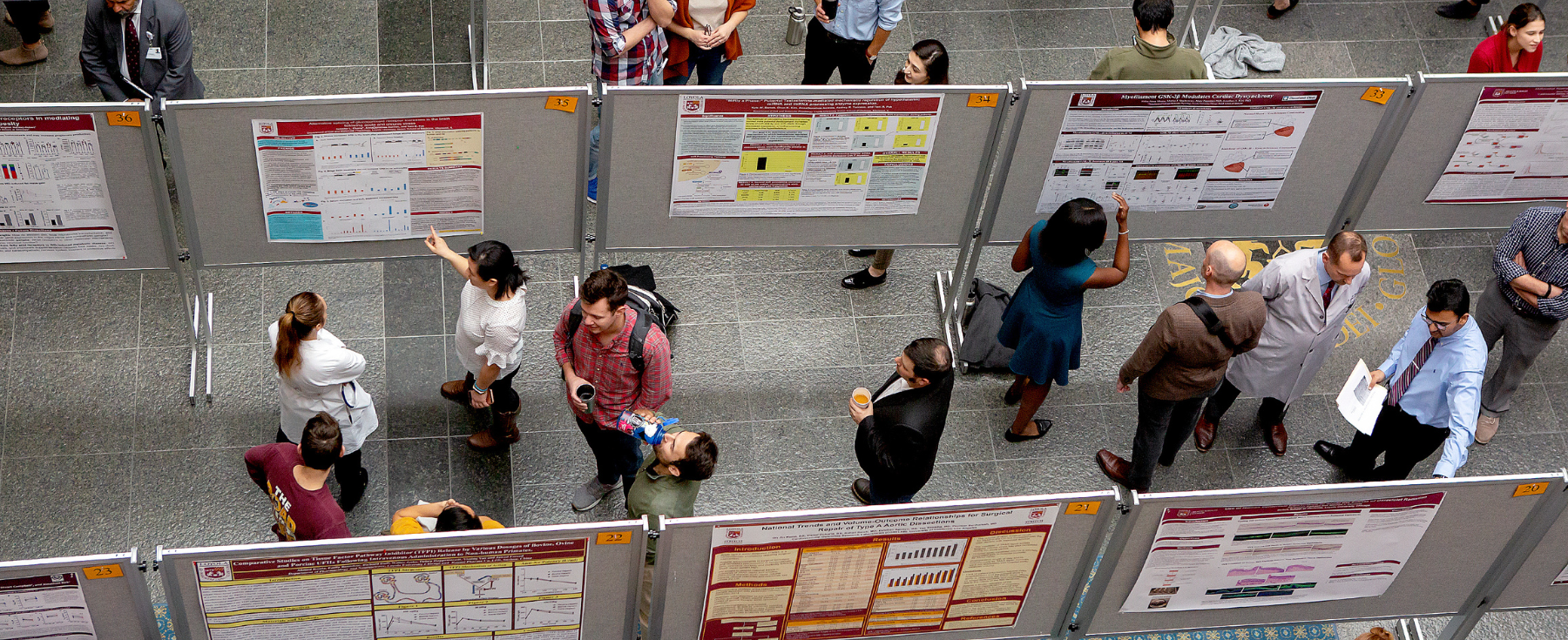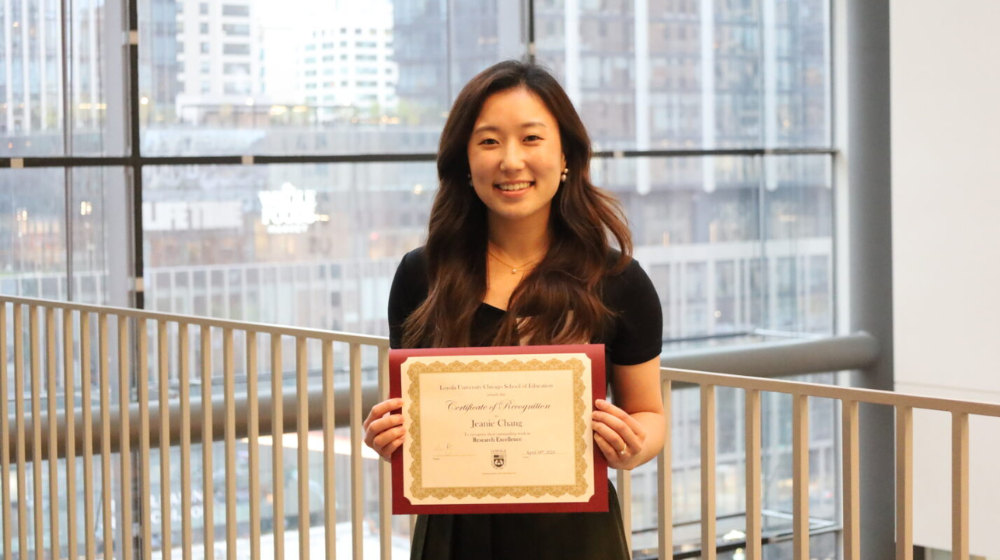
Jeanie Chang
Transformative Education Through Culturally Responsive Research
Elevating Voices by Looking Beyond Numbers and at People
For Jeanie Chang, a fifth-year Counselling Psychology student, her journey through Loyola’s School of Education has been marked by a profound evolution in her perspectives on education. As she embarked on this path, Chang was drawn to Loyola by its faculty’s commitment to social justice and their expertise in areas aligned with her interests, such as Asian American psychology and combatting racism in academia.
She found that the school's emphasis on social justice wasn't merely a token inclusion but a fundamental aspect of its ethos, evident in both the faculty’s and the program’s values. Through coursework and hands-on experiences, she grappled with the systemic injustices embedded within educational systems, prompting her to confront her own assumptions and biases. “I came in caring about social justice, but I think I developed a deeper, more sophisticated understanding of my part in promoting social justice,” she reflected.
"Even if I don’t know where exactly I’m going to be, I know the values that are important to me and are guiding me." Jeanie Chang
At the heart of Loyola’s mission is a dedication to community engagement and a recognition of the importance of centering the knowledge and experiences of marginalized populations. Chang resonated deeply with this approach, seeing it as a departure from the traditional, individualistic mindset prevalent in psychological research. Through her studies, she began to shift her focus from viewing social issues as solely individual struggles to understanding their systemic roots, particularly in her exploration of migratory grief among Korean-American immigrants.
Chang’s academic journey illuminated the potential of education as a catalyst for systemic change. “My dissertation is on critical consciousness; that construct was termed by Paulo Freire and it’s the ability to recognize critique and transform social oppression. Freire was an educator and he believed that this doesn’t just happen naturally,” she explained. Inspired by Freire’s concept, she saw the importance of intervention in recognizing and transforming social oppression. Her experiences challenged her to move beyond individualistic solutions towards systemic interventions, where she beleives she can effect broader structural changes.

Jeanie Chang's acceptance of the 2024 School of Education Research Excellence Award
Central to Chang’s growth was her realization of the inherent biases and limitations within academia, particularly in the realm of research. She grappled with the disillusionment of academic work's impact and the realization that meaningful change required collaborative, community-centered approaches. Her time at Loyola has provided her with opportunities to engage in transformative research methodologies, such as consensual qualitative research, which emphasized collective interpretation and challenged individualistic paradigms.
She reflected on this, saying, “I think being disillusioned by the work, especially research... can be discouraging, and so I think that’s where Dr. Matthew Miller’s lab has been really helpful processing those things with the other lab members and thinking about creative ways where, ‘Ok, how can we actually make research that’s accessible for other people and for community members and for the people that we actually want to reach?’”
Outside the classroom, Chang actively applies what she has learned to real-world settings through initiatives like the Asian American therapists’ mentorship program. “...for Asian American therapists specifically, we don’t meet a lot of Asian therapists in our training, so being able to connect them with professionals that have been in the field longer, like newer professionals, was important for me.” She aims to bridge the gap between academia and practice, and that mentorship has allowed for more collaborative thinking.

Counseling Psychology
PhD in Counseling Psychology
Join our Nationally Recognized, Social Justice Oriented, APA-Approved Program in Counseling Psychology. Earn your doctoral degree and license to practice as a professional psychologist in a program focused on breaking down barriers to equity in health and education.
Learn MoreOne way she has accomplished this is by not only focusing on academic growth but also by meaningful connections with peers. These relationships serve as pillars of support and mentorship, fostering a collaborative environment conducive to personal and professional development. She mentioned a friend in the program a year older, who she could bounce ideas off of, discuss interests, or just sit on the beach and talk. “She’s also Korean, so we had a lot of similar experiences that we could process, and so to this day we still do studies together, and we’ve been collaborating together and like that kind of relationship I think has been so crucial for my growth as a research but also being able to learn from her and have that support from her throughout the process too. She’s been such a good mentor-figure.” Chang said.
Chang’s journey at Loyola was not just marked by academic achievement but by a profound personal transformation. She has begun to emerge as a leader imbued with empathy, critical insight, and a deep sense of responsibility toward her community. Through her words and actions, she embodied the spirit of Loyola’s mission, demonstrating a steadfast commitment to fostering inclusive, empowering educational environments. Armed with a robust foundation in social justice education and a network of allies, she approaches the future with optimism and determination. Whether within academia or beyond its confines, she remains steadfast in her pursuit of positive change, guided by the lessons learned and the connections forged during her time at Loyola.
Story by Ethan Letsch
For Jeanie Chang, a fifth-year Counselling Psychology student, her journey through Loyola’s School of Education has been marked by a profound evolution in her perspectives on education. As she embarked on this path, Chang was drawn to Loyola by its faculty’s commitment to social justice and their expertise in areas aligned with her interests, such as Asian American psychology and combatting racism in academia.
She found that the school's emphasis on social justice wasn't merely a token inclusion but a fundamental aspect of its ethos, evident in both the faculty’s and the program’s values. Through coursework and hands-on experiences, she grappled with the systemic injustices embedded within educational systems, prompting her to confront her own assumptions and biases. “I came in caring about social justice, but I think I developed a deeper, more sophisticated understanding of my part in promoting social justice,” she reflected.
At the heart of Loyola’s mission is a dedication to community engagement and a recognition of the importance of centering the knowledge and experiences of marginalized populations. Chang resonated deeply with this approach, seeing it as a departure from the traditional, individualistic mindset prevalent in psychological research. Through her studies, she began to shift her focus from viewing social issues as solely individual struggles to understanding their systemic roots, particularly in her exploration of migratory grief among Korean-American immigrants.
Chang’s academic journey illuminated the potential of education as a catalyst for systemic change. “My dissertation is on critical consciousness; that construct was termed by Paulo Freire and it’s the ability to recognize critique and transform social oppression. Freire was an educator and he believed that this doesn’t just happen naturally,” she explained. Inspired by Freire’s concept, she saw the importance of intervention in recognizing and transforming social oppression. Her experiences challenged her to move beyond individualistic solutions towards systemic interventions, where she beleives she can effect broader structural changes.
Central to Chang’s growth was her realization of the inherent biases and limitations within academia, particularly in the realm of research. She grappled with the disillusionment of academic work's impact and the realization that meaningful change required collaborative, community-centered approaches. Her time at Loyola has provided her with opportunities to engage in transformative research methodologies, such as consensual qualitative research, which emphasized collective interpretation and challenged individualistic paradigms.
She reflected on this, saying, “I think being disillusioned by the work, especially research... can be discouraging, and so I think that’s where Dr. Matthew Miller’s lab has been really helpful processing those things with the other lab members and thinking about creative ways where, ‘Ok, how can we actually make research that’s accessible for other people and for community members and for the people that we actually want to reach?’”
Outside the classroom, Chang actively applies what she has learned to real-world settings through initiatives like the Asian American therapists’ mentorship program. “...for Asian American therapists specifically, we don’t meet a lot of Asian therapists in our training, so being able to connect them with professionals that have been in the field longer, like newer professionals, was important for me.” She aims to bridge the gap between academia and practice, and that mentorship has allowed for more collaborative thinking.
One way she has accomplished this is by not only focusing on academic growth but also by meaningful connections with peers. These relationships serve as pillars of support and mentorship, fostering a collaborative environment conducive to personal and professional development. She mentioned a friend in the program a year older, who she could bounce ideas off of, discuss interests, or just sit on the beach and talk. “She’s also Korean, so we had a lot of similar experiences that we could process, and so to this day we still do studies together, and we’ve been collaborating together and like that kind of relationship I think has been so crucial for my growth as a research but also being able to learn from her and have that support from her throughout the process too. She’s been such a good mentor-figure.” Chang said.
Chang’s journey at Loyola was not just marked by academic achievement but by a profound personal transformation. She has begun to emerge as a leader imbued with empathy, critical insight, and a deep sense of responsibility toward her community. Through her words and actions, she embodied the spirit of Loyola’s mission, demonstrating a steadfast commitment to fostering inclusive, empowering educational environments. Armed with a robust foundation in social justice education and a network of allies, she approaches the future with optimism and determination. Whether within academia or beyond its confines, she remains steadfast in her pursuit of positive change, guided by the lessons learned and the connections forged during her time at Loyola.
